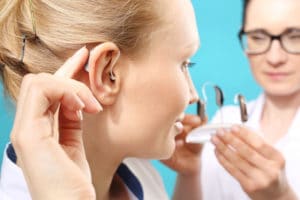While hearing aids are built to be long-lasting, the rugged environment of your ear combined with very intricate technology of your devices may result in damage over time. Fortunately, in most cases, regular maintenance and repairs will help your hearing aids last until the time comes to upgrade.
Cost of Hearing Aid Repairs

While the cost of hearing aids can be hefty, repairs often are not, especially if they’re still under the manufacturer’s warranty or you’ve purchased insurance. The cost of your repair depends on the type and degree of damage, so talk to your audiologist for more details.
Common Hearing Aid Repairs
Your hearing aids go where you go and do what you do, so it’s no wonder they’re susceptible to damage. Some of the most common types of hearing aid repairs are associated with moisture, tubing and microphone malfunction.
Moisture
Digital technology and moisture never interact well together. Water exposure and moisture buildup can affect sound quality or cause your devices to stop working altogether. Your audiologist can remove moisture from the devices to make sounds clear again, but if the circuits inside have been damaged, the device will likely need to be sent to the manufacturer for repair.
Broken Tubing
Tubing can easily be damaged or degrade over time when debris becomes lodged inside or it becomes overstretched. This kind of damage can also lead to poor sound quality. Fortunately, this is one of the easiest fixes; a hearing professional can replace tubing quickly and for little cost.
Broken Microphone
A broken microphone means you won’t be able to pick up sounds. An audiologist can either repair or replace the microphone depending on the level of damage.
Preventing Repairs
Regular maintenance is the best way to prevent having to bring your devices in for repairs. Some tips for maintaining your devices at home include:
- Open the battery compartment at night so moisture can evaporate.
- Purchase a dehumidifier to store your devices in in case they are exposed to moisture.
- Clean your hearing aids with a soft cloth every day. Talk to your audiologist about purchasing a cleaning kit.
- Use a wax guard to prevent buildup of debris.
For more tips on preventing repairs or to schedule a time to bring your devices in, call Sharp Hearing today.

